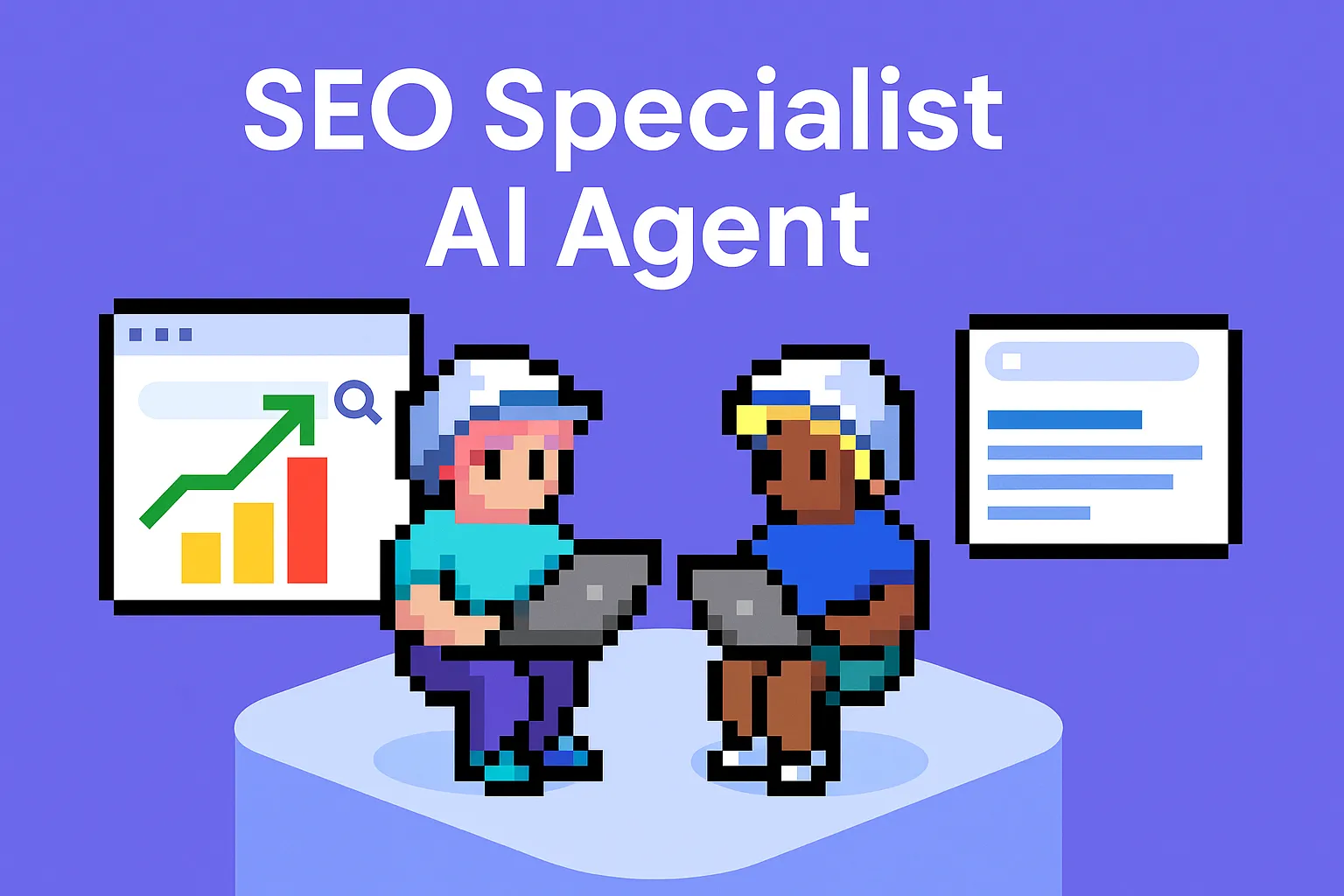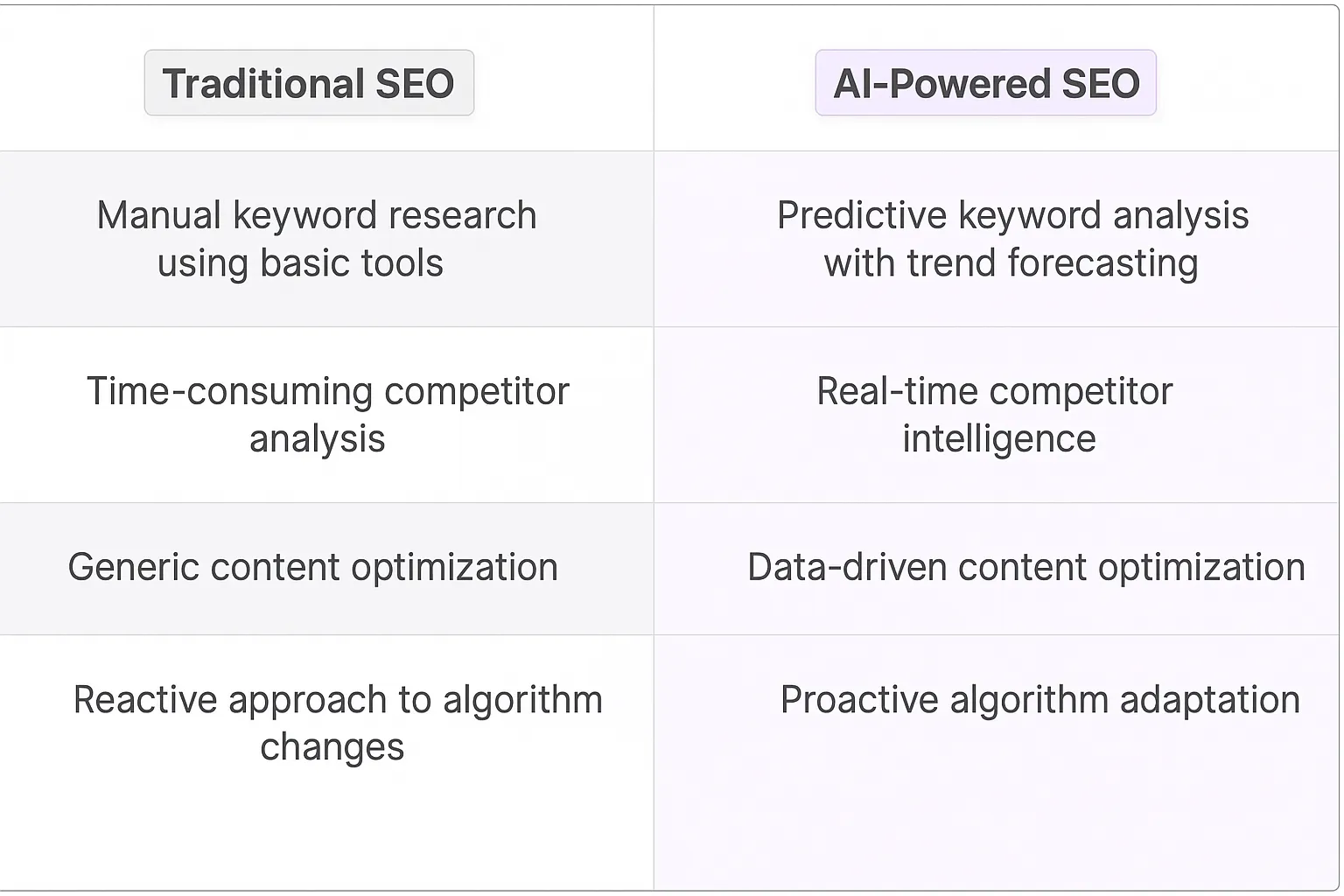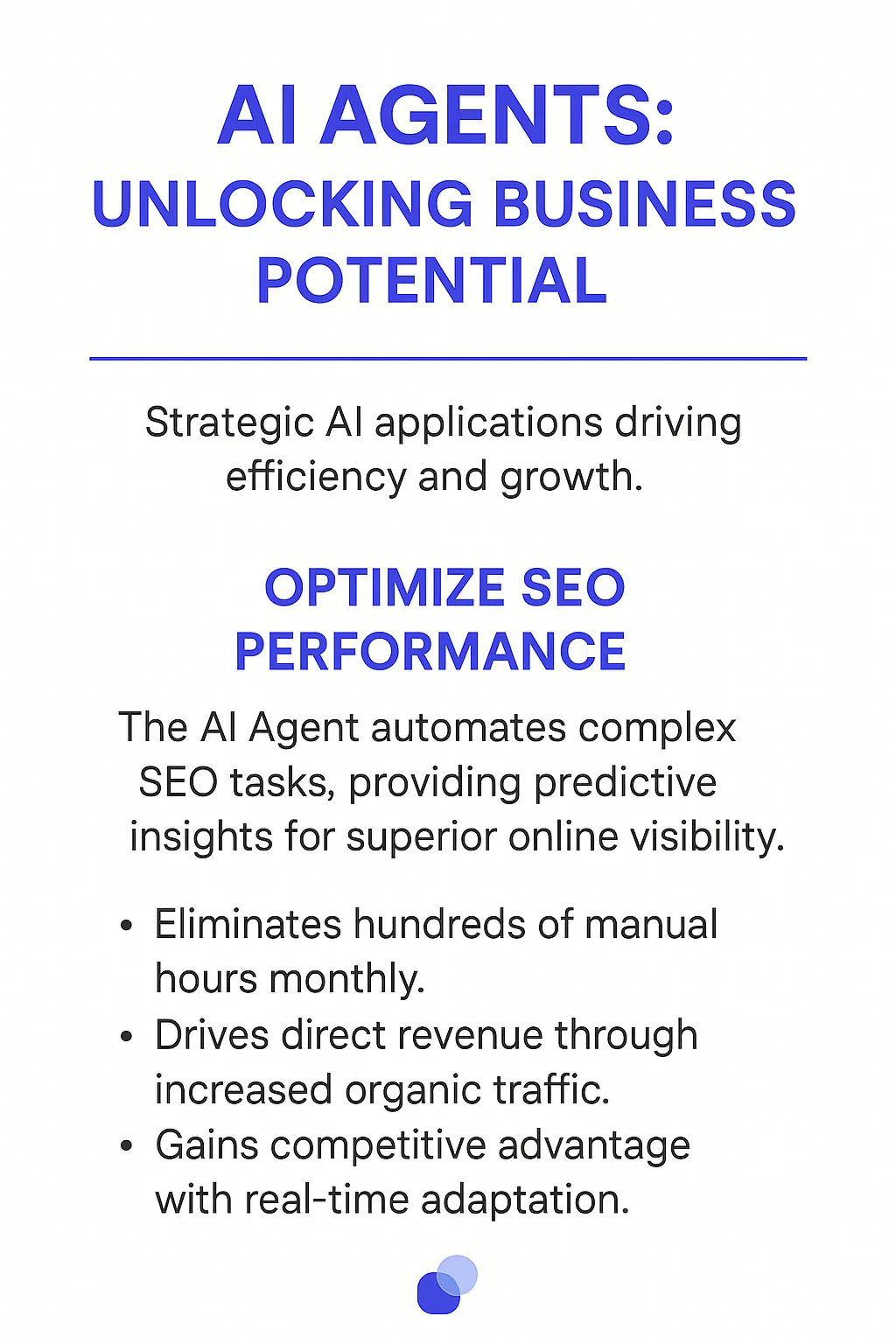SEO Specialist is a cutting-edge AI-powered tool designed to augment the capabilities of search engine optimization professionals. It's not just another SEO software; it's a digital teammate that works alongside human experts to analyze, strategize, and execute complex SEO tasks. This AI agent combines machine learning, natural language processing, and predictive analytics to provide real-time insights, automate routine processes, and adapt to the ever-changing landscape of search algorithms.

Before AI agents entered the SEO arena, specialists relied on a hodgepodge of tools, spreadsheets, and gut instincts. They'd spend hours poring over keyword data, manually analyzing competitor websites, and crafting content strategies based on limited insights. It was a time-consuming process that often felt like throwing spaghetti at the wall to see what sticks.
SEO teams would use a combination of Google Analytics, keyword research tools, and content management systems to piece together their strategies. But these tools, while useful, lacked the ability to provide real-time, holistic insights or adapt quickly to the ever-changing search engine algorithms.
Enter AI agents - the game-changers in the SEO world. These digital teammates are like having a team of data scientists, content strategists, and SEO gurus working 24/7 to optimize your online presence. Here's why they're causing a seismic shift in the industry:
The integration of AI agents in SEO isn't just an incremental improvement; it's a paradigm shift. SEO specialists who embrace these digital teammates will find themselves operating at a level of efficiency and effectiveness that was previously unimaginable. Those who don't might find themselves as relevant as a flip phone in the age of smartphones.
As we move forward, the role of the SEO specialist will evolve from being a doer of tasks to a strategic orchestrator, leveraging AI agents to execute a vision for dominating search results. It's an exciting time to be in SEO, and those who can harness the power of AI agents will be the ones writing the rules of the game.

SEO specialists can leverage AI agents to transform their workflow and amplify their impact. These digital teammates excel at handling data-intensive tasks, freeing up human experts to focus on strategy and creative problem-solving.
One key process where AI shines is comprehensive keyword research. An AI agent can sift through vast amounts of search data, identifying emerging trends and long-tail opportunities that humans might overlook. It can analyze search intent, categorize keywords by funnel stage, and even suggest content ideas tailored to each keyword cluster.
Another critical process is competitor analysis. AI agents can continuously monitor competitor websites, tracking changes in their content strategy, backlink profiles, and SERP rankings. This real-time intelligence allows SEO specialists to stay ahead of the curve, adapting their strategies proactively rather than reactively.
On a more granular level, AI agents can tackle numerous time-consuming SEO tasks with remarkable efficiency. For instance, they can perform automated content audits, evaluating factors like keyword density, readability, and internal linking structure across an entire website. This allows SEO specialists to quickly identify and prioritize optimization opportunities.
AI can also assist with technical SEO tasks such as identifying and diagnosing crawl errors, duplicate content issues, or page speed bottlenecks. By automating these checks, SEO specialists can ensure their sites maintain peak performance without getting bogged down in manual audits.
Another valuable task for AI agents is generating data-driven content briefs. By analyzing top-ranking pages for a given keyword, the AI can compile key topics, questions to answer, and even suggest optimal content length and structure. This empowers content creators to produce highly relevant, SEO-friendly content from the get-go.
Lastly, AI agents can revolutionize link building efforts. They can identify high-quality link prospects by analyzing factors like domain authority, relevance, and outbound link patterns. Moreover, they can even draft personalized outreach emails, increasing the success rate of link building campaigns.
By offloading these processes and tasks to AI agents, SEO specialists can operate at a higher level, focusing on strategy development, client relationships, and interpreting complex data patterns. The result? A more efficient, effective, and scalable SEO operation that delivers superior results for clients.

The SEO landscape is constantly shifting, and AI agents are becoming the secret weapon for savvy marketers. These digital teammates aren't just tools; they're game-changers that are redefining how we approach search engine optimization. From e-commerce giants to local businesses, companies across the board are tapping into the power of AI to dominate search results and drive organic traffic.
Let's dive into some real-world scenarios where SEO specialist AI agents are making waves. These aren't your run-of-the-mill use cases – we're talking about AI that's so good at its job, it might make human SEO specialists sweat a little. But don't worry, it's not about replacing humans; it's about augmenting our capabilities and freeing us up to focus on the big-picture strategy that machines can't handle (yet).
Whether you're a startup founder looking to bootstrap your way to the top of Google or a Fortune 500 company aiming to maintain your search dominance, these industry-specific examples will show you how AI is transforming the SEO game. Get ready to see how these digital SEO gurus are helping businesses crush their organic search goals and leave their competitors in the dust.
Let's dive into the e-commerce world, where SEO Specialist AI agents are becoming game-changers. Picture a mid-sized online retailer with thousands of products across multiple categories. Traditionally, optimizing each product page for search engines would be a Herculean task, often resulting in generic, templated descriptions that barely move the needle in search rankings.
Enter the SEO Specialist AI agent. This digital teammate can analyze vast product catalogs, understanding the nuances of each item, from tech specs to user sentiment. It then crafts unique, search-optimized descriptions for every single product. But here's where it gets interesting: the AI doesn't just stuff keywords. It weaves in long-tail phrases, answers potential customer questions, and even adapts its writing style to match the brand voice.
The real magic happens when you connect this AI to your inventory and sales data. Suddenly, you're not just optimizing for search; you're optimizing for conversion. The AI can prioritize products with higher margins or those that need a sales boost, adjusting SEO strategies in real-time based on market trends and competitor movements.
This isn't just about saving time or cutting costs. It's about creating a dynamic, responsive SEO strategy that treats each product as a unique entity in the vast digital marketplace. For e-commerce players, this level of granular, AI-driven SEO could be the difference between being buried on page 10 of search results and capturing that coveted featured snippet.
The implications are profound. Smaller e-commerce players can now compete with giants on a level playing field, at least in terms of SEO sophistication. And for larger retailers, this technology offers a way to maintain a personal touch at scale, ensuring that every product tells its own unique story to both search engines and potential customers.
The travel industry is ripe for disruption by SEO Specialist AI agents. Let's zoom in on destination marketing organizations (DMOs) - the entities responsible for promoting cities, regions, or countries to potential visitors. These organizations often struggle with creating targeted, SEO-optimized content that speaks to diverse traveler segments while staying ahead of rapidly changing travel trends.
An SEO Specialist AI agent in this context isn't just a content generator; it's a strategic asset that can transform how destinations compete for visibility in the digital space. The AI can continuously analyze search patterns, social media trends, and even weather forecasts to predict and capitalize on emerging travel interests.
For instance, when a viral social media post suddenly sparks interest in a previously overlooked local attraction, the AI can quickly generate and optimize content to capture this surge in search traffic. It's not just reactive, though. By analyzing historical data and global events, the AI can anticipate future trends and prepare SEO strategies in advance.
What's particularly fascinating is how this AI can segment and personalize SEO strategies. It might create and optimize different landing pages for adventure seekers, luxury travelers, and budget backpackers - all for the same destination. Each page would use language, structure, and keywords tailored to its specific audience, dramatically increasing the chances of conversion.
The AI doesn't stop at text. It can suggest optimal image tags, video descriptions, and even local schema markup to boost search visibility across multiple platforms. This multi-modal approach is crucial in the visually-driven world of travel marketing.
Perhaps most importantly, this AI can help DMOs compete with global online travel agencies (OTAs) that often dominate search results. By creating hyper-local, deeply informative content at scale, destinations can reclaim their narrative and direct relationship with potential visitors.
This shift towards AI-driven, personalized SEO in travel marketing isn't just about getting more eyes on a destination. It's about fundamentally changing how people discover and plan their travels, potentially redistributing tourism flows and economic benefits. For DMOs willing to embrace this technology, it's an opportunity to punch above their weight in the fiercely competitive arena of destination marketing.
Implementing an SEO Specialist AI Agent isn't just about slapping some machine learning on top of existing SEO tools. It's a complex dance of algorithms, data processing, and real-time adaptability. One of the biggest hurdles is keeping up with search engine algorithm changes. Google alone makes thousands of tweaks annually, with major updates dropping like surprise albums. Your AI needs to be nimble enough to detect these shifts and adjust its strategies accordingly.
Another technical mountain to climb is natural language processing (NLP). SEO isn't just about keywords anymore; it's about understanding user intent and context. Your AI needs to grasp the nuances of human language, including colloquialisms, idioms, and even emojis. This isn't just parsing text; it's about understanding the rich tapestry of human communication in all its messy glory.
Data integration is another beast altogether. An effective SEO AI needs to pull from diverse data sources - web analytics, social media signals, competitor data, and more. It's like trying to conduct an orchestra where each instrument is playing in a different room. The challenge lies in harmonizing this data cacophony into actionable insights.
On the operational front, the first hurdle is often internal resistance. SEO has traditionally been a human-driven field, and there's a natural skepticism about handing the reins to an AI. It's not just about convincing the C-suite; it's about getting buy-in from the trenches - the content creators, the marketers, the developers who've been doing SEO their way for years.
Then there's the question of integration with existing workflows. SEO touches nearly every aspect of digital presence - content creation, web development, social media strategy. Your AI can't operate in a vacuum; it needs to play nice with other tools and processes. It's like introducing a new player to a well-oiled sports team mid-season. The potential is there, but the adjustment period can be rocky.
Let's not forget about the ethical considerations. SEO walks a fine line between optimization and manipulation. An AI, left unchecked, might veer into black hat territory in its quest for results. Setting up proper guardrails and human oversight is crucial. It's like teaching a teenager to drive - you need to instill the right values and judgment, not just the mechanics.
Lastly, there's the ever-present challenge of ROI justification. SEO results often take time to materialize, and attributing success to specific actions can be tricky. With an AI system, you're not just justifying the cost of tools or manpower, but potentially significant infrastructure and ongoing AI training costs. It's a long game, and in a world of quarterly reports and quick wins, that can be a tough sell.
SEO Specialist AI Agents are not just tools; they're the future of search engine optimization. As we've seen, these digital teammates are transforming how SEO professionals approach their work, from automating tedious tasks to providing deep, actionable insights that were previously unattainable. The ability to process vast amounts of data, adapt to algorithm changes in real-time, and predict future trends is giving businesses a significant edge in the competitive digital landscape.
The most successful SEO strategies will come from those who can effectively collaborate with these AI agents, leveraging their strengths while applying human intuition and strategic thinking.
As search engines continue to evolve and user behavior becomes increasingly complex, the role of AI in SEO will only grow. Businesses and SEO professionals who embrace this technology now will be well-positioned to dominate search results in the future. The question is no longer whether to adopt AI in SEO, but how quickly and effectively you can integrate it into your digital strategy. The SEO game is changing, and AI agents are the power players you want on your team.